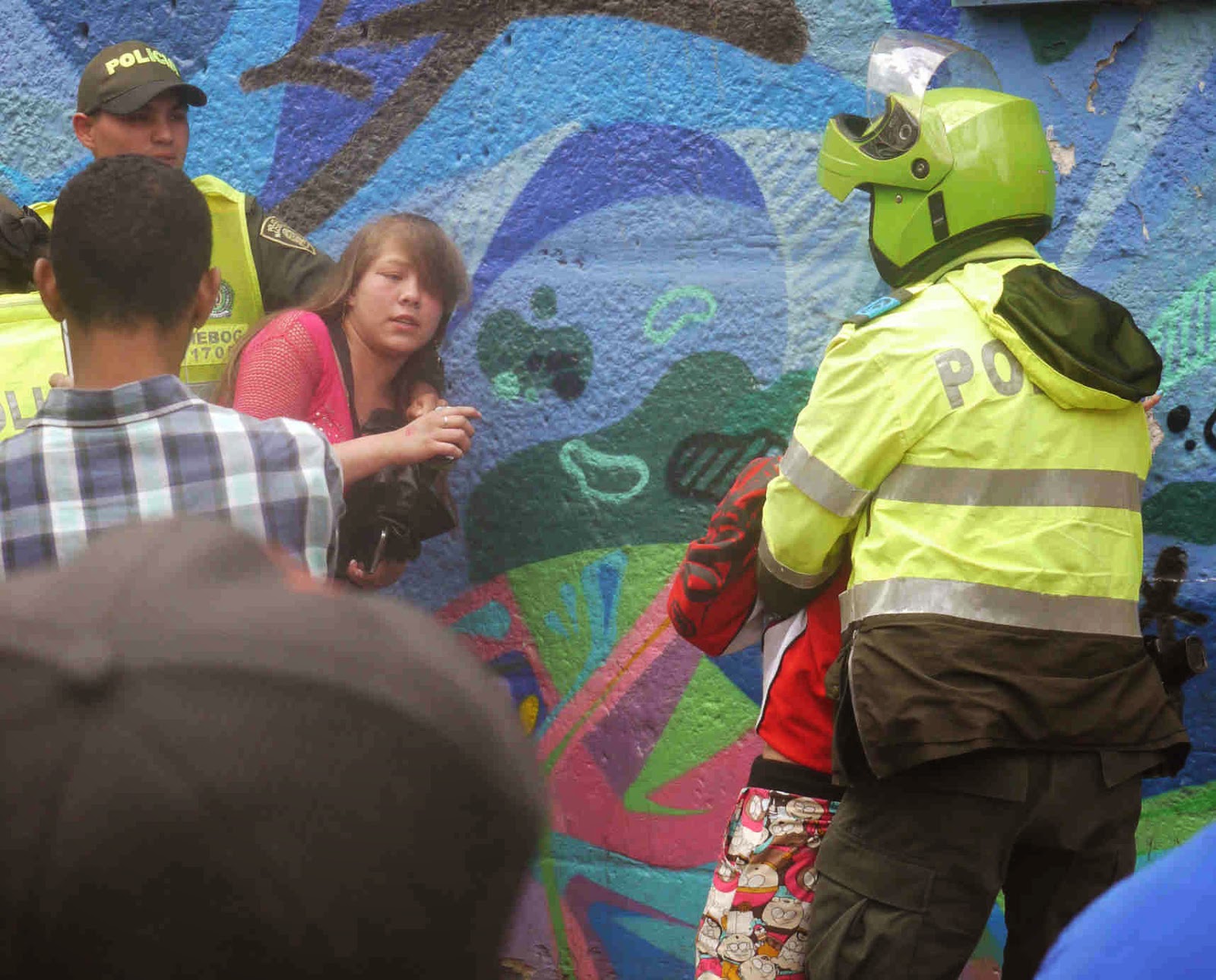 |
| Side-by-side, but far apart. Presidents Santos and Maduro last year. |
In 2010, Pres. Santos angered conservatives by calling Venezuela's then-Pres. Hugo Chávez "my new best friend." After all, Chávez led a nation which had apparently financed Colombian guerrillas and even threatened Colombia with war just a few years before. But Santos wanted both Venezuela's trade and its support in peace negotiations he hoped to start with the FARC guerrillas.
My, how things change.
Today, those negotiations appear to be on the road to success; Cuba, the negotiations' host, is making friends with the United States, reducing Venezuela's leverage. And Venezuela's economy is in a tailspin, nullifying its political and economic influence.
 |
Visits prohibited? Leopold Lopez turns himself
in to police in Feb. 2014. |
That's why Colombia's Ministry of Foreign Affairs finally found the backbone to criticize Caracas's latest disrespect for human rights, when it denied Colombian ex-Pres. Andrés Pastrana, accompanied by ex-presidents of Chile and Mexico, the right to visit an imprisoned Venezuelan opposition politician.
That politician, Leopoldo Lopez, was mayor of part of Caracas and later become a leading presidential contender. But in 2004 the Venezuelan government banned Lopez from politics using a dubious ruling which has been criticized by multiple human rights organizations. Then, last February, Lopez was arrested on a grab-bag of dubious charges such as 'instigation of delinquency, damage to public property, incitement to riot, homicide, and terrorism', based on Lopez's support of anti-government protests, some of which had turned violent. In most democracies, it would seem, supporting protests is a civil right and those who had committed violence would be prosecuted.
Many human rights advocates have called Lopez's detention politically motivated, and see it as another sign of Venezuela's increasing authoritarianism.
That Lopez is really a political prisoner, even a hostage, became clear a few weeks ago, when Venezuelan Pres. Maduro offered to exchange him for a Puerto Rican independence activist imprisoned in the U.S. Maduro's proposal also erased any doubts that Venezuela's courts are anything but puppets of the president.
And, under both Venezuelan law and international norms, a prisoner has a right to receive visitors.
Maduro accused Colombian ex-Pres. Pastrana and the other two conservative ex-leaders of promoting a coup and being financed by narcotrafficking money. Such wild, baseless, slanderous charges are par for the course for the Venezuelan government, but Colombia has traditionally stayed mute about Venezuela's trampling of its own democracy. This time, however, Colombia's foreign ministry responded by demanding respect for its ex-president, but went on to express hope that Lopez would "recover his liberty as soon as possible."
Opining on Venezuela's internal affairs was certain to ruffle feathers, and it did. Maduro called it a setback for relations. Colombia should not care. As things are going in Venezuela, repression appears likely to grow much worse before things improve, and Colombia and other neighbors will be .morally bankrupt if they do not criticize the situation.
A frightening case in point is this week's resolution issued by Venezuela's Ministry of Defense authorizing the military to
"use potentially mortal force, whether with firearms or other ppotntially mortal weapon...to avoid disorders, support the legitimate authority and reject all aggression, confronting it immediately with the necessary means."
That's a terrifying resolution, because it enables an authoritarian government to employ deadly violence against its own people on just about any pretext. After all, the people carrying the firearms will be deciding whether the 'disorders' and 'aggression' require the use of deadly force.
"The only interpretation one can make is that it's an attempt to intimidate the population and impede them from protesting," Roberto Briceño León, coordinator of the Venezuela Observatory of Violence, said on a Caracas radio program.
Tourists Go Home?
 |
| Loving Venezuela? Or loving to escape from it? |
Can't help mentioning this. Marketing a nation with one of the world's highest homicide rates and severe shortages of basic goods to tourists must be quite a challenge. So, give the Venezuelans points for trying.
But one of their latest campaigns may have backfired. It shows a young, foreign-looking man being enthusiastically embraced by a woman.
'
We love Venezuela because we receive foreigners like one of our own,' boasts the accompanying text.
Inconveniently, however, it turns out that the young man is Miami Herald correspondent Jim Wyss, and the picture was taken when he returned home from Venezuela last November after being detained for 48 hours and interrogated by military intelligence officers.
After Wyss recognized himself in the photo, Venezuela's tourism ministry removed the pic from its website.
By Mike Ceaser, of
Bogotá Bike Tours





























































